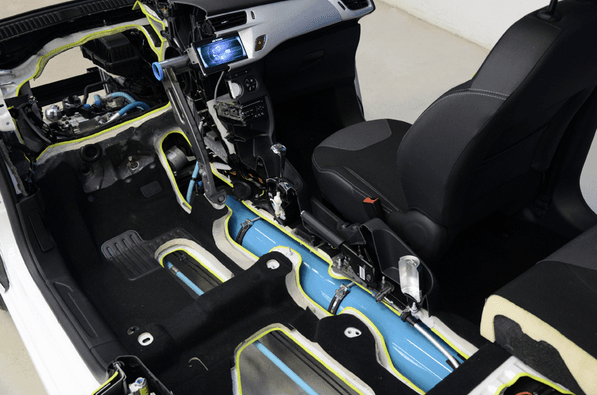French carmaker brings air-powered hybrid car to market
The compressed air accumulator is the heart of Peugeot’s new air-powered hybrid car. (Photo courtesy of Peugeot.)
French car company Peugeot has created a new hybrid car that could be twice as efficient and half as pricy as traditional battery hybrids.
The secret? It runs on compressed air.
Peugeot engineer Karim Mokaddem said the secret of this Hybrid Air car to to capture the energy lost while decelerating or braking.
“What we are doing with our hybrid air technology is as soon as you’re just braking or just decelerating, you are able to store the energy very quickly,” he said. “Compressed air, which is a new way of looking at energy storage in a hybrid car.”
The compressed air system is fairly simple. Mokaddem said it looks like a scuba tank.
“In this scuba tank, what you’re going to do is store in the compressed air the energy that is normally lost when you are braking or accelerating,” he said.
Whereas an electric car stores the lost energy in batteries, the Hybrid Air car stores the energy in an air tank.
“We’re able to use this energy very rapidly and very frequently. It allows us to have a drastic fuel consumption reduction in urban situations of 45 percent,” Mokaddem explained.
While the fuel use reductions are great in town, with fuel economy up to 80 miles per gallon, on the highway they’re not. So Peugeot has targeted the car at people who do largely city driving. But the car will run just fine on the highway, using a typical gasoline engine.
And whereas electric hybrids are almost silent when running on batteries, Mokaddem said that air-powered engine has a distinct sound.
“You will have a very dedicated sound signature when you’re using your car with these hydraulic components,” he said. “But it’s not something that is difficult to handle in a normal situation.”
And while some environmentalists are critical of the pollution left behind by creating electric hybrids, Mokaddem says the air engine is built entirely out of recyclable parts.
“This is a very important point which you cannot today achieve with batteries and electrical parts, which means it is much more ecologically friendly than other technologies,” he said.
The vehicle, which sells for about $20,000 to $25,000, costs about half as much as a normal electric hybrid, Mokaddem said.
“If you look at the parts, very independently, there’s nothing new. What is new is the way you are combining all these parts in a small car, and the way you are controlling the system and the energy that’s in the car,” Mokaddem said.
